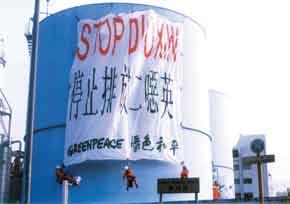
4 minute read
Public Engagement
Non-Government Organization involvement
In China, NGOs have only began to develop after Chinese reforms in the late 1970s and NGO and government relationships are still developing. BOCOG elicited some environmental NGO consultation in the designing and planning of Olympic events and venues. BOCOG has also collaborated with NGOs on some specific campaign efforts (see below).
From as early as 1992, Greenpeace began working with Sydney Olympic bid organizers to encourage them to include far-reaching environmental initiatives in venues and event systems to showcase environmental solutions. At the Sydney, Athens and now Beijing Games, Greenpeace believes NGOs have a role to play in encouraging and monitoring the environmental aspects of events such as the Olympics to ensure the best possible outcomes.
Greenpeace Guidelines
Guideline 34
Full, comprehensive and publicly accountable independent auditing of all environmental data for all aspects of the Olympics must be mandatory.
Guiding Environmental Principles
6. Community, NGO and public involvement
Consistent and high level consultation with community, environmental and social groups and the public is essential from the start. Establish a clear process for conflict resolution.
Selected NGO projects in the Beijing Games
Environmental NGOs were eager to put the theme “Green Olympics” into practice and conducted various campaigns aimed at raising public awareness in the areas of energy efficiency, conservation, and environmental standards.
Greenpeace’s own lightbulb campaign aimed to raise public
Greenpeace pushing Beijing restaurants to eliminate disposable chopsticks.
awareness about the need for energy efficient lighting in order to reduce GHG emissions. With Olympian and BOCOG organizing committee member Deng Yaping as campaign spokesperson, the campaign raised awareness about energy efficiency and helped elementary schools and households to change over 15 000 of their old incandescent bulbs to more energy efficient compact fluorescent light bulbs (CFLs).
While BOCOG has issued their own “Environmental Protection Guidelines for Beijing’s 2008 Catering Services” to demand catering companies not to use disposable products, Greenpeace went a step further. Greenpeace’s chopsticks campaign has successfully received pledges from more than 300 restaurants in Beijing and over 1 000 restaurants in Guangzhou to stop using disposable chopsticks in an attempt to protect tropical forests, namely the Paradise Forests, which stretch from Southeast Asia to the Solomon Islands in the Pacific. Greenpeace’s campaigns aimed to encourage the direct participation of civil society in taking action on environmental issues.
NGO representatives from Friends of Nature and Global Village were appointed as environmental consultants by BOCOG to participate in key levels of decision making.
Conservation International (CI), an advocate for nature conservation, has worked with BOCOG in providing design advice for the five Olympic mascots as well as integrating environmental messages into the torch relay. CI has launched its own “For Our Natural Splendor” campaign in partnership with the China Environmental Cultural Promotion Association (CECPA), a state affiliated group. This is a campaign involving various activities across China aimed at promoting environmental awareness, treeplanting, wildlife free dining choices, and carbon footprint awareness.
The World Wide Fund for Nature (WWF) has launched its 20 ways to 20% energy efficiency campaign to educate the public on how to reach China’s energy efficiency goals. The organization has also worked to promote forest stewardship and sustainable timber use within China and the region. Its sustainable kindergarten demonstration project aims to educate the public about eco-labeling.
Greenpeace Recommendations – Beijing Games and Beyond
Opening communication channels with environmental NGOs represents a good first step in setting up the conditions for collaboration between government and civil society. While some public engagement efforts were organized by BOCOG 174 and sponsors, Greenpeace believes that there should be more public engagement efforts that lead to wider citizen participation involving concrete environmental actions. Governments need to utilize the expertise and suggestions of NGOs in developing a strong role for civil society engagement in protecting the environment and in other areas of public concern.
Although government-NGO joint efforts have increased through the process of the Games, China still has a long ways to go in engaging with civil society as true partners. Chinese official governing bodies could have worked more with environmental NGOs to further efforts to green the Games as well as to further engage the public if more open, regular and transparent communication had been established. Currently, there is still limited communication between NGO groups and government. Environmental information needs to be more transparent and easily accessible to ensure third party assessment and scrutiny.
Future Olympic host cities should regard NGO environmental engagement in the Torino Games as best practice. In 2001, the Torino Olympic Organizing Committee established the Environment Advisory Assembly and invited representatives from Italian environmental non-governmental organizations and local authorities to be involved in the organization of the Games. The Assembly met four times a year to work together towards sustainable solutions to environmental issues. These forms of continuous, open and transparent partnerships represent true civil society engagement in Olympics planning. Furthermore, as the Sydney and Torino Games have demonstrated, NGOs can often help to deliver many of the goals and objectives of environmental protection.

Greenpeace introduces energy saving light bulbs to students in Beijing.
174. BOCOG has also organized a number of public education campaigns such as the “Stop Driving for One Day” Campaign to raise awareness around car pollution, and to encourage students to “Reserve a Barrel of Rainwater” to encourage water reuse.










